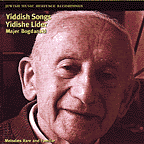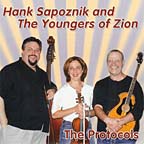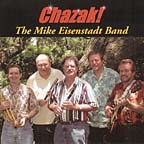So, tomorrow night the New York Jewish Music and Heritage Fest and Heeb Magazine will cosponsor something they are calling "1st Annual Jewish Music Awards".
This is undeniably a good thing in theory. Given that there isn't even a Grammy award for anything relating to "Jewish", it is great that at least somewhere in the Jewish community someone is noticing Jewish music. But as I look at the nominees and categories, I can't help but reflect that the awards also feature something else for which Heeb is notorious: clueless attitude.
Don't get me wrong. Heeb is a great collection of bad attitude and Jewish symbology divorced from that messy Jewish context, a place where the confusion between "of Jewish ancestry" and "connected to current Jewish culture" thrives. And this can be a lot of fun.
The attitude can lead to some nifty places. The award announcements begin with a lifetime achievement award for Joey Ramone: an interesting bit of irony given Joey's passing four years ago. "Jewish" may not have been any obvious (even non-obvious?) part of Ramone's music or outlook, but he was Jewish, and the Ramones played kick ass music. Who could object?
Next there is the "Heritage" aware for Debbie Friedman. This, too, reflects some interesting perspective on "Heritage," given some in the Cantorial establishment's horror at the way that Friedman's music has supplanted traditional Jewish cantorial music, and the 19th and 20th century explosion of complex new Jewish liturgical music that is now largely replaced by Friedman's folky, camp song approach to spirituality. That's one way of listening to her music. For most people, however, Friedman merits the award because her songs speak to them, and because they sing them! Imagine, Jewish liturgical music that almost all Jews love to sing! And in which many Jews find spiritual comfort and sustenance! Good irony here, and wonderful to honor Friedman.
From this point forward, however, the names on the awards have less and less to do with how people who know the music might hear it, and more to do with the poverty of language available to Heeb's folks to describe music. It is totally weird to hear bands like Rashanim (who certainly can claim klezmer influences) or Juez (where this claim is more than a little stretched) compared to a very straight klezmer band such as Klezmer Juice. But then, Klezmer Juice isn't a new band, either. If I were going for really hot, newish klezmer bands that have been putting out the heat to New York audiences, I would surely have found a place to mention, say, Metropolitan Klezmer, Kleztraphobix, and Isel of Klezbos. The bands that did get mentioned are all worth mentioning, but wouldn't it honor them more if there were categories for, say "traditional Klezmer" and "Radical Jewish Music" (to use the Tzadik marketing label). There is some awareness that some things are hard to categorize. Rather than include "Matisyahu," who along with "SoCalled" pretty much owns the Jewish-centric hip hop scene, he is tossed into a bucket called "New Approach". Having no understanding, I guess of what Sephardic music is, or what Sarah Aroeste is doing with that tradition, her dance-sephardic music is thrown into "best mix of jazz and tradition". That might have been a good place to put "Rashanim," mind you, but Jazz fans aren't going to find much familiar at Aroeste's concerts. Dance fans would rejoice, so if there is no way to acknowledge Sephardic traditions, this band might have fit as well in the "Best Danceable" category with Oi Va Voi. (Did I mention the lack of a Yiddish music category? Does anyone at Heeb have any idea of Yiddish beyond faux Yiddish words like "shlong"?)
Finally we come to one of the most interesting categories, "Middle Eastern music." Certainly "Pharaoh's Daughter" belongs to this category. Certain putting "Divahn" here is curious (although, given that some of the music Divahn plays comes from Middle Eastern music traditions older than Sephardic, you could kind of make that case). But then we come to "Hadag Nachash", the brilliant new Israeli pop band, a wonderful fusion of world pop music that represents the best of music played in a Middle Eastern country, but which has even less direct connection to "Middle Eastern" music than, say, Divahn. No, Dorothy, we're not in Kansas any more and when speaking of culture, "Israeli" does not necessarily equate to what most people are thinking of when they hear the term "Middle Eastern". (There is a good book to be written about Israeli pop music as representing new Middle Eastern sounds, but those new sounds have little more connection to what most people think of when referring to traditional Middle Eastern music than tin pan alley had to traditional Native American chant.)
As much as I have complained about Heeb ignoring Sephardic music as a category, there is another, even more popular category which they have ignored, and that also accounts for some odd pigeon-holing: music coming out of the Orthodox community. In addition to his hip hop cred, Matisyahu, along with a host of interesting bands playing styles ranging from bluegrass to rock to all other forms of pop music, represents an assimilation of popular music into distinctly religious culture. It isn't an area that I understand well—I don't know enough to spot the 5% worth listening to in a community in which I spend minimal time. But, surely when acknowledging what is new and noteworthy in Jewish music there is room to consider Orthodox music on its own terms, rather than to notice the occasional Orthodox artists such as Juez or Matisyahu by trying to ignore their main inspiration and pigeonhole them elsewhere.
If I sound exasperated, let me point out one very important fact. Heeb may be clueless on the specifics, but there isn't any one else thinking to recognize new Jewish music. It sure as hell isn't coming from the Jewish mainstream. So, congrats to Heeb on honoring Jewish music! Now, if next year, and in coming years, they start from some understanding of Jewish music and culture, imagine! (And even at that, I find it easier to believe that someone at Heeb will get a clue than the idea that there will be Jewish music—or other Jewish cultural honors—from other Jewish publications or institutions.
 My favorite Jewish blog has done some dynamite coverage of several events at the New York Jewish Music and Heritage fest. You can start from the most recent by just popping over to
My favorite Jewish blog has done some dynamite coverage of several events at the New York Jewish Music and Heritage fest. You can start from the most recent by just popping over to  the 2nd International Jewish Music festival-seminar in Moscow
the 2nd International Jewish Music festival-seminar in Moscow Majer, who was born in Poland, but lived most of his life in the UK was credited as a source in the amazing 2000 Budowitz album,
Majer, who was born in Poland, but lived most of his life in the UK was credited as a source in the amazing 2000 Budowitz album,  I just wanted to extend some props to the
I just wanted to extend some props to the  It took me a week to get started, but that figures. Attend any intensive week with klezmorim and it takes a while to readjust. But I'm now running the KlezKanada weblog. New listings will be posted each day to parallel the original event two weeks ago. You can follow the action and add your own comments at
It took me a week to get started, but that figures. Attend any intensive week with klezmorim and it takes a while to readjust. But I'm now running the KlezKanada weblog. New listings will be posted each day to parallel the original event two weeks ago. You can follow the action and add your own comments at  In today's Tampa, Florida, Tribune, there is an obituary for Mike Eisenstadt, long-time Jewish radio host, long-time klezmer clarinetist, long-time participant of the Jewish-Music mailing list, and of course, long-time activist in the Tampla, FL Jewish community and federation.
In today's Tampa, Florida, Tribune, there is an obituary for Mike Eisenstadt, long-time Jewish radio host, long-time klezmer clarinetist, long-time participant of the Jewish-Music mailing list, and of course, long-time activist in the Tampla, FL Jewish community and federation.